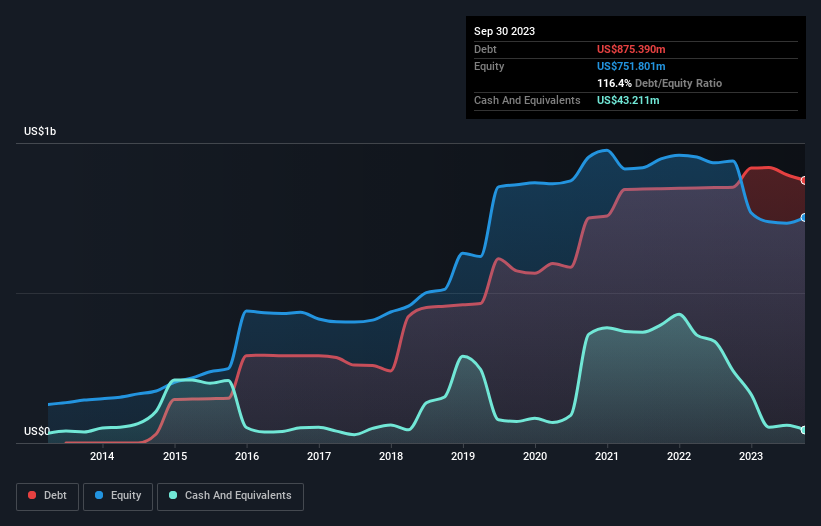Some say volatility, rather than debt, is the best way to think about risk as an investor, but Warren Buffett famously said that 'Volatility is far from synonymous with risk.' So it might be obvious that you need to consider debt, when you think about how risky any given stock is, because too much debt can sink a company. We note that Envestnet, Inc. (NYSE:ENV) does have debt on its balance sheet. But is this debt a concern to shareholders?
When Is Debt A Problem?
Generally speaking, debt only becomes a real problem when a company can't easily pay it off, either by raising capital or with its own cash flow. Ultimately, if the company can't fulfill its legal obligations to repay debt, shareholders could walk away with nothing. However, a more usual (but still expensive) situation is where a company must dilute shareholders at a cheap share price simply to get debt under control. Of course, plenty of companies use debt to fund growth, without any negative consequences. When we think about a company's use of debt, we first look at cash and debt together.
See our latest analysis for Envestnet
What Is Envestnet's Net Debt?
The chart below, which you can click on for greater detail, shows that Envestnet had US$875.4m in debt in September 2023; about the same as the year before. However, it does have US$43.2m in cash offsetting this, leading to net debt of about US$832.2m.

How Healthy Is Envestnet's Balance Sheet?
We can see from the most recent balance sheet that Envestnet had liabilities of US$270.2m falling due within a year, and liabilities of US$1.01b due beyond that. On the other hand, it had cash of US$43.2m and US$114.9m worth of receivables due within a year. So its liabilities total US$1.12b more than the combination of its cash and short-term receivables.
Envestnet has a market capitalization of US$2.83b, so it could very likely raise cash to ameliorate its balance sheet, if the need arose. However, it is still worthwhile taking a close look at its ability to pay off debt.
In order to size up a company's debt relative to its earnings, we calculate its net debt divided by its earnings before interest, tax, depreciation, and amortization (EBITDA) and its earnings before interest and tax (EBIT) divided by its interest expense (its interest cover). This way, we consider both the absolute quantum of the debt, as well as the interest rates paid on it.
Envestnet shareholders face the double whammy of a high net debt to EBITDA ratio (8.2), and fairly weak interest coverage, since EBIT is just 0.91 times the interest expense. The debt burden here is substantial. Looking on the bright side, Envestnet boosted its EBIT by a silky 44% in the last year. Like a mother's loving embrace of a newborn that sort of growth builds resilience, putting the company in a stronger position to manage its debt. The balance sheet is clearly the area to focus on when you are analysing debt. But it is future earnings, more than anything, that will determine Envestnet's ability to maintain a healthy balance sheet going forward. So if you're focused on the future you can check out this free report showing analyst profit forecasts.
Finally, a company can only pay off debt with cold hard cash, not accounting profits. So it's worth checking how much of that EBIT is backed by free cash flow. Over the last three years, Envestnet actually produced more free cash flow than EBIT. There's nothing better than incoming cash when it comes to staying in your lenders' good graces.
Our View
Envestnet's interest cover was a real negative on this analysis, as was its net debt to EBITDA. But its conversion of EBIT to free cash flow was significantly redeeming. When we consider all the elements mentioned above, it seems to us that Envestnet is managing its debt quite well. But a word of caution: we think debt levels are high enough to justify ongoing monitoring. Of course, we wouldn't say no to the extra confidence that we'd gain if we knew that Envestnet insiders have been buying shares: if you're on the same wavelength, you can find out if insiders are buying by clicking this link.
Of course, if you're the type of investor who prefers buying stocks without the burden of debt, then don't hesitate to discover our exclusive list of net cash growth stocks, today.
Valuation is complex, but we're here to simplify it.
Discover if Envestnet might be undervalued or overvalued with our detailed analysis, featuring fair value estimates, potential risks, dividends, insider trades, and its financial condition.
Access Free AnalysisHave feedback on this article? Concerned about the content? Get in touch with us directly. Alternatively, email editorial-team (at) simplywallst.com.
This article by Simply Wall St is general in nature. We provide commentary based on historical data and analyst forecasts only using an unbiased methodology and our articles are not intended to be financial advice. It does not constitute a recommendation to buy or sell any stock, and does not take account of your objectives, or your financial situation. We aim to bring you long-term focused analysis driven by fundamental data. Note that our analysis may not factor in the latest price-sensitive company announcements or qualitative material. Simply Wall St has no position in any stocks mentioned.
About NYSE:ENV
Envestnet
Through its subsidiaries, provides wealth management software and services in the United States and internationally.
Good value with reasonable growth potential.
Similar Companies
Market Insights
Community Narratives



